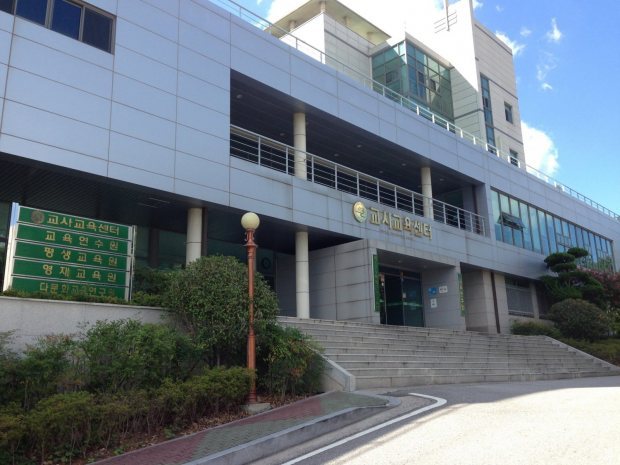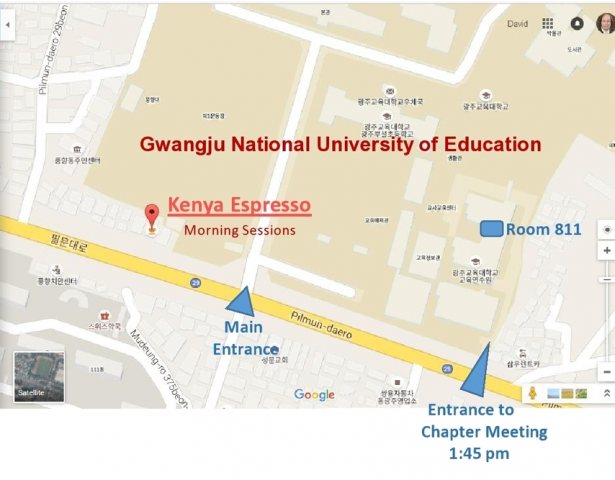
Gwangju-Jeonnam Chapter June Meeting
.
New ––– Morning Korean Help Cafe ––– New
Time: 10:00 - 10:50 am (Sat., June 11). After-10 arrivals are welcome.
Location: Kenya Espresso Cafe, near GNUE. (The 2nd building from GNUE main gate, towards E-mart. Map at bottom.)
Bring your questions about the Korean language.
Target group: High-Beginner to Low-Intermediate.
David Shaffer at the Help Table. Casual format.
––– Morning Reflective Practice Session –––
Topic: How Playful Is Your Teaching?
Session Facilitator: Bryan Hale
Time: 11:00 am - 12:30 pm (Sat., June 11)
New Location: Kenya Espresso Cafe near GNUE. (The 2nd building from GNUE main gate, towards E-mart. Map at bottom.)
––– MAIN MEETING SCHEDULE –––
Time: Saturday, June 11, 2016, 1:45 - 5:00 pm
Location: Gwangju National University of Education (GNUE), Teacher Training Center (교사교육센터) 1st Floor; Room 811. Detailed directions HERE.
1:45 pm: Sign-in and Meet-and-Greet (Admission is free. Future membership is welcomed.)
2:00 - 2:50 pm: Presentation 1
Dictionary Dependence: Addressing Reading Fluency in L2 Learners
Cara Scott
2:50 - 3:10 pm: Refreshment Break
3:10 - 4:00 pm: Presentation 2
English Camps: Please the Parents, Engage the Children
Jennifer Brown
4:10 - 5:00 pm: Swap-Shop Presentations
Share your Teaching Ideas, Classroom Activities, and Teaching Wisdom with the group.
(Everyone is encouraged to share. Short tidbits are welcomed. Handouts also welcomed.)
5:00 pm: Announcements / Drawing for Door Prizes / Closing
––– After-meeting dinner at The First Alleyway, downtown –––
Presentation Summaries and Presenter Bio-sketches
.
Dictionary Dependence:
Addressing Reading Fluency in L2 Learners
By Cara Scott
In this modern technology-driven world, people find themselves with an almost infinite amount of knowledge right at their fingertips. Technology can be a great resource for language learners to take advantage of in their quest for language acquisition. Students find themselves surrounded by free websites, tutorials, online language lessons, digital dictionary applications, online translators, etc. These new digital resources have in-turn brought about an infinite number of potential opportunities for instructors to take advantage of to enhance their classroom environments and help their students.
Despite all of the exciting new possibilities brought about by technology, as instructors we must ask the question: “Is this too good to be true?” Nothing comes without its own prospective pitfalls that need to be identified and safeguarded against. So what are some of the risks that technology poses in the classroom? One skill in the classroom that is at risk of potentially being affected by all of this easily accessible technology is the L2 learner’s reading fluency.
At times, reading can be an overlooked skill in the language classroom, often it is simply a means to an end. When the word “fluency” is used, it is often in the context of a language learner’s speaking ability. Frequently in classrooms, reading is merely used as a way to convey new vocabulary to students and demonstrate how that vocabulary is used correctly in sentences. Students find themselves reading sentences, paragraphs or short stories, for the sole purpose of identify the meaning of vocabulary. In this case, online translators and dictionary applications are a convenient shortcut for these language learners. As students perform these tasks, often repetitively in classrooms, this can reinforce the idea that reading is for the purpose of vocabulary acquisition. This can lead students to assume that reading is simply a means to an end, and that dictionary applications are a convenient way to speed up the process.
This presentation is going to take a closer look at how to address the potential risks that modern technology, like online translators or digital dictionaries, pose to students’ reading development. We will also take a look at potential alternatives for instructors to employ in the classroom that can aid students in developing their reading fluency, as well as helping to dissipate some of the dictionary dependence in L2 learners.
The Presenter
 Cara Scott is a graduate of Central Washington University with a degree in Asian Studies and a certification in TESL (Teaching English as a Second Language). While attending university, she worked in the ESL Department as a teacher’s assistant and volunteered as a mentor with incoming international students. In 2012, she was hired by the Gyeongsan Office of Education to teach English and relocated to South Korea. Currently Cara is working as an English instructor at Chonnam National University in the Language Education Center.
Cara Scott is a graduate of Central Washington University with a degree in Asian Studies and a certification in TESL (Teaching English as a Second Language). While attending university, she worked in the ESL Department as a teacher’s assistant and volunteered as a mentor with incoming international students. In 2012, she was hired by the Gyeongsan Office of Education to teach English and relocated to South Korea. Currently Cara is working as an English instructor at Chonnam National University in the Language Education Center.
_______________
English Camps: Please the Parents, Engage the Children
By Jennifer J. Brown
Camps in Korea are very different from camps in the West. In the West, camps have many activities that include pitching a tent, gathering firewood, canoeing, archery, outdoor games, and making s’mores and singing around a campfire. English camps in Korea are for learning academic English with vocabulary, grammar, and sentence structures.
As preparations are being made for a well-thought-out camp program, there are many criteria to consider for a summer or winter program. Often when creating an English camp in Korea, administrative work, budget, time of day the classes will be run, and the academic side of things are given emphasis over focusing on the fun. This presentation will explain a variety of camps that take place throughout Korea, introduce examples of activities from several camps, list things to consider when planning a camp, and focus on a five-day curriculum.
With audience participation, ideas for both the book side of camp to please the parents, and the active side of camp to make it fun for the students will be explored. Students not only need routine, but they also relish variety. This presentation will look at the overall goal of camp, daily objectives, and individual outcomes for different tasks. Themes that could be used for each day, ways tasks can be presented and practiced, and methods to keep track of what each student has done, will be discussed.
Let’s discover how these lessons can be used across a wide range of students’ grades and abilities. Regardless of their proficiency levels, interests, and learning styles, students will be engaged and ultimately will learn English through a well-planned summer or winter program. Students will develop confidence in English through songs, games, school subjects, everyday situations, and the presenter’s favourite, role-plays.
The Presenter
 Jennifer J. Brown came to South Korea from Canada in 2003. She is an assistant professor in the Department of International Cultures and Languages at Gwangju University. She is currently working on her MA TESOL-MALL with Woosong University and has a TESOL certificate. She has been teaching at the university level for five years and taught at the elementary level for eight years. Jennifer enjoys finding new ways to engage students, and her professional interests include teaching English in context and task-based teaching.
Jennifer J. Brown came to South Korea from Canada in 2003. She is an assistant professor in the Department of International Cultures and Languages at Gwangju University. She is currently working on her MA TESOL-MALL with Woosong University and has a TESOL certificate. She has been teaching at the university level for five years and taught at the elementary level for eight years. Jennifer enjoys finding new ways to engage students, and her professional interests include teaching English in context and task-based teaching.
______________________________________________
Photo: The Gwangju National University of Education (GNUE / 광주교육대학교), Teacher Training Center (교사교육센터), venue for our main meeting - 1st floor, Room 811.




